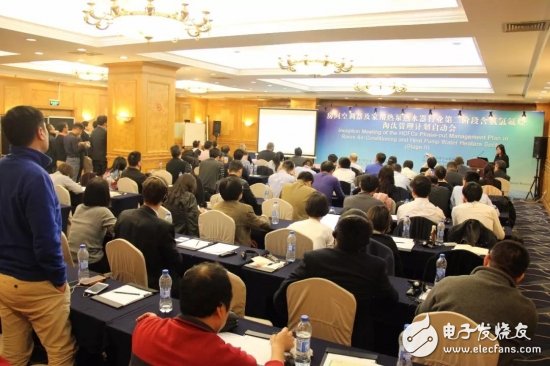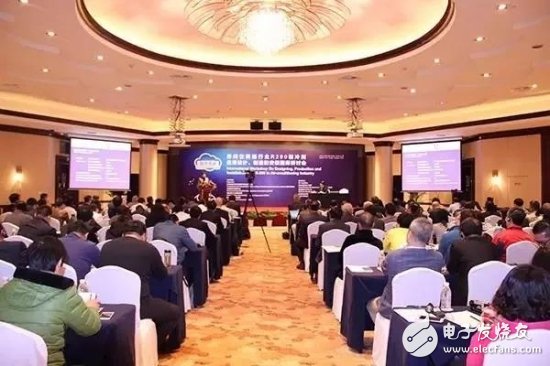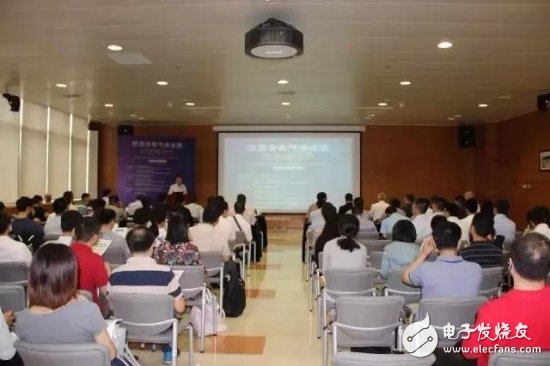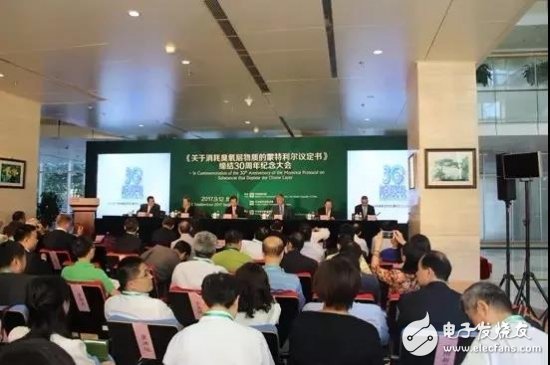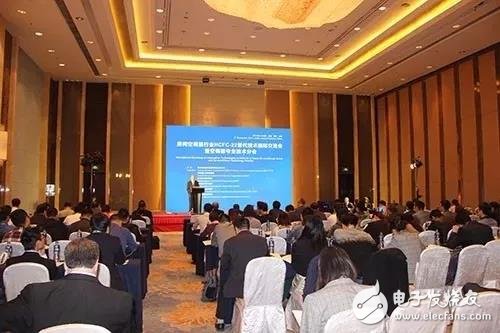In 2017, it was an important year for China's room air conditioner industry. During this year, a number of policies and standard boots were put on the ground, and the holding of important international conferences not only made Chinese room air conditioner manufacturers more aware of international and domestic policies. The situation has also enabled the international community to see the Chinese government and industry's propositions and determinations, all of which will have an important impact on the future development of China's room air conditioner industry. On March 11, 2017, the second phase of HCFC elimination in the room air conditioner and domestic heat pump water heater industry jointly organized by the United Nations Industrial Development Organization, the Italian Ministry of Environmental Territory and Oceans, the Environmental Protection Cooperation Center of the Ministry of Environmental Protection of China and the China Household Electrical Appliances Association. The Management Plan Launching Meeting was held in Shanghai. The holding of the meeting marked the official launch of the second phase of HCFC phase-out management in China's room air conditioner industry. According to the requirements of the “Hunan Room Air Conditioner and Household Heat Pump Water Heater Industry Phase II HCFC Phase-out Management Plan†approved by the 77th Montreal Protocol Multilateral Fund Executive Committee, the second phase of China's room air conditioner and domestic heat pump water heater industry will be Accelerated phase-out of HCFCs based on the first phase, with a 20% cut in baseline by 2018 and a 45% cut by 2020, ahead of the original target of a 35% cut in 2020. While accelerating the phase-out of HCFC refrigerant R22, China's room air conditioner industry is also facing the choice of refrigerant replacement technology. Considering the current trend of international and domestic policies, the choice of ozone-friendly and low-carbon environmentally friendly hydrocarbon refrigerant R290 has become an inevitable trend. In the second stage, China's room air conditioner industry will accelerate the adoption of R290 refrigerant and the transformation of production lines, and transform at least 20 R290 room air conditioner production lines and three R290 compressor production lines. QB/T 4975-2016 "Safety Technical Specifications for the Production of Household and Similar Use Room Air Conditioners Using Flammable Refrigerants" and QB/T 4976-2016 "Use of Combustible Refrigerant Room Air Conditioner Products", led by the China Household Electrical Appliances Association The special requirements of the two industry standards approved by the Ministry of Industry and Information Technology, implemented on April 1, 2017. These two standards specify the safety technical requirements, operating procedures, safety management, and room air conditioner products using flammable refrigerants for the production of air conditioners for household and similar use rooms using flammable refrigerants. The safety requirements have made up for the lack of standards in the safe production and product transportation of room air conditioners using flammable refrigerants in China, so that China's air-conditioning enterprises have rules to follow in the process of production line transformation and product storage and transportation, which will help promote China. The room air conditioner industry is accelerating the adoption of environmentally friendly refrigerants. On April 11, 2017, co-sponsored by the Environmental Protection Foreign Cooperation Center of the Ministry of Environmental Protection, the China Household Electrical Appliances Association, the United Nations Industrial Development Organization, and the United Nations Environment Program, co-organized by the United Nations Development Programme, the German International Cooperation Agency, and the China Refrigeration and Air-Conditioning Industry Association. The International Symposium on the Design, Manufacture and Installation of R290 Refrigerant Applications for Room Air Conditioner Industry was held in Ningbo, Zhejiang. The meeting invited representatives from Southeast Asia and Middle East countries to participate in the conference. Through the conference, they explained the form of the refrigerant replacement technology route in the room air conditioner industry in China, and the form of on-site visits to the Oaks manufacturing plant and the Jiaxing Nanyang Vocational and Technical College in Zhejiang. R & D and manufacturing capabilities and product operation, firm confidence in the global room air conditioner industry to take the ozone-friendly and low-carbon environmentally friendly refrigerant alternative route. The EU is an important pole in the global political and economic arena, and is also one of the main export destinations for room air conditioners and household refrigerators/freezers in China. The EU's policy on the environmental protection of household appliances has always led the global policy trends. The EU Fluoride Gas Act is a regulation that has an important impact on the global refrigeration and air-conditioning industry. On July 17, 2017, sponsored by China Household Electrical Appliances Association, United Nations Industrial Development Organization, United Nations Environment Program, United Nations Development Programme, German International Cooperation Agency, China Environmental Protection Environmental Protection Cooperation Center, European Commission technical support The EU Fluoride Gas Act Countermeasures Seminar was held in Beijing. At the meeting, the organizers invited the drafters of the EU Fluoride Gas Act to interpret the bill in detail. The EU Fluoride Gas Act requires EU member states to implement fluorine gas production and import quota management. From January 2017, all imported HFCs pre-filling equipment will require a quota, otherwise they will not enter the EU market. Not only that, but the EU is still cutting quotas year by year, and will cut 37% at baseline by 2018. The EU's fluorine gas quotas have become scarce resources, quotas are getting less and less, and prices are getting higher and higher. For Chinese companies, this means that the threshold for exporting to the EU is gradually increasing. If HFC refrigerant is used, China's room air conditioner enterprises will probably lose the EU's vast market. China's room air conditioner enterprises must recognize the situation and adopt a more low-carbon and environmentally friendly refrigerant to gain a foothold in the EU market. On September 12th, the 30th anniversary of the conclusion of the Montreal Protocol on Substances that Deplete the Ozone Layer, hosted by the Ministry of Environmental Protection and the United Nations Environment Program and hosted by the Environmental Protection Cooperation Center of the Ministry of Environmental Protection, was held in Beijing. In his congratulatory letter to the General Assembly, Premier Li Keqiang clearly pointed out that the Kigali Amendment to the Montreal Protocol, which was reached in 2016, "opened a new chapter in the history of synergistic response to ozone depletion and climate change, and China will continue to shoulder its due international obligations. In-depth international exchanges and cooperation in the field of environmental protection will make new contributions to global ecological security." In his speech, Minister of Environmental Protection Li Ganjie also clearly emphasized that China should speed up the ratification process of the Kigali amendment, fully prepare for the implementation of the amendment, and promote the development and application of green low-carbon alternative technologies, and vigorously develop the ozone layer. Friendly, climate-friendly alternative technology that meets energy and safety requirements. The attitude of the Chinese government has already pointed out the road for the replacement of refrigerants in the room air conditioner industry in China, that is, the green low-carbon replacement technology outside the list of controlled substances in the Kigali Amendment, and the only alternative technology that meets this condition is the hydrocarbon industry. Quality R290. On November 3, 2017, the room air conditioner industry HCFC- co-sponsored by the Environmental Protection Foreign Cooperation Center of the Ministry of Environmental Protection, the United Nations Industrial Development Organization, the United Nations Environment Program, the United Nations Development Programme, the German International Cooperation Agency, and the China Household Electrical Appliances Association. 22 Alternative Technology International Exchange Conference was held in Hefei. Refrigerant replacement is a common issue facing the global room air conditioner industry. Especially after the Montreal Protocol's Kigali amendment is reached, the global room air conditioner refrigerant replacement direction has been clear: it is both harmless to the ozone layer and low-carbon environmental protection. China is the world's largest manufacturer of room air conditioners. The annual international conference on HCFC-22 replacement technology in the room air conditioner industry is the largest international seminar in the field. Through this platform, China's room air conditioner industry expresses our technical proposition to the international community - using the natural working fluid R290 as an alternative technology. The claim of China's room air conditioner industry has been strengthened by international organizations. At the same time, technical exchanges through this platform will also help to unite the industry and jointly promote the application and development of environmentally friendly refrigerants in the room air conditioner industry. In 2016, the international community reached the Kigali Amendment to the Montreal Protocol to reduce potent greenhouse gas HFCs. As of November 17, 2017, more than 20 parties have ratified the amendment, and the Kigali amendment has reached the conditions for entry into force and will enter into force on January 1, 2019. After the Kigali amendment enters into force, developed countries will cut HFCs consumption year by year from 2019, and cut to 85% at baseline by 2036; most developing countries including China will freeze HFCs consumption in 2024. And began to cut from 2029. On the surface, China has a long time to freeze and reduce the consumption of HFCs, but China is the world's largest exporter of room air conditioners. Developed countries are important export destinations for China's room air conditioners. If the air-conditioning refrigerant and production line cannot be switched in time, the risk of losing the developed country market will be faced, and it will also be in a disadvantageous position in the global competition. On November 23, 2017, in honor of the 30th anniversary of the Montreal Protocol, at the “Ozone Layer Protection†Awards Ceremony held in Montreal, Canada, Xia Yingxian, Director of the International Department of the Ministry of Environmental Protection and the International Department of the Ministry of Environmental Protection, China Household Electrical Appliances Association And the State Grid reporter Chen Jianming from the media of the China Household Electrical Appliances Association was awarded the “Ozone Layer Protection Policy and Implementation Leadership Award†by the United Nations Environment Program and the Canadian Government, the “Ozone Protection Political Leadership Award†and the “Ozone Layer Protection Partner Award†and “ The Best Media Promotion Award for the Protection of the Ozone Layer." The international community commends the Ministry of Environmental Protection of China and the China Household Electrical Appliances Association for recognizing the tremendous contribution made by the Chinese government and industry to the protection of the ozone layer and the safety of the earth's ecology. It is also affirming China's technological line of ideas, which continues to fulfill the Montreal Protocol globally. The Kigali amendment has a clear policy guiding significance. It is worth mentioning that while the global phase-out of ozone-depleting substances under the framework of the Montreal Protocol, it is also necessary to reduce the HFCs with high greenhouse effect potentials in accordance with the requirements of the Kigali Amendment. The global HVAC and refrigeration air conditioning industry presents enormous challenges. China's room air conditioner industry uses ozone-friendly and environmentally friendly low-carbon natural refrigerant R290 as a refrigerant replacement technology, but it provides a reasonable solution for this worldwide problem. The international community's praise is the recognition and praise of this technology choice in the Chinese room air conditioner industry. In December 2016, the IEC60335-2-40 international standard SC61D/WG16 working group meeting hosted by the China Household Electrical Appliances Association formed a draft for the leakage of refrigerant, which was hosted by the China Household Electrical Appliances Association as the host of IEC International. The first draft of the consultation draft formed by the standard revision meeting, and the collection and processing of comments was completed in 2017. Since the international community has no urgent need for the use of flammable refrigerants, the International Standards Organization lacks systematic research on flammable refrigerants, which has caused international standards to impose extremely severe restrictions on the flammable refrigerant charge limits. But with the requirements of the international community Pcb Terminal Block,Pcb Barrier Terminal Blocks,Pcb Terminal Block Connector,Barrier Terminal Blocks And Connectors Sichuan Xinlian electronic science and technology Company , https://www.sztmlch.com